Did you know some dog breeds can change your homeowners insurance? Doberman Pinschers, Pit Bulls, and Rottweilers are often banned by insurance companies. They are on 100% of the restricted lists. This shows how certain dogs affect insurance risk and decisions.
Homeowners insurance often covers claims for dog bites or injuries. So, insurers want to avoid high-risk breeds. Dogs banned by insurers might not get coverage, leaving owners liable for claims. With dog bite claims averaging $44,760, insurers are closely watching which breeds they insure.
Key Takeaways
- Doberman Pinschers, Pit Bulls, and Rottweilers are the top three most frequently banned dog breeds by homeowners insurance companies.
- Insurers often exclude “banned” or “restricted” dog breeds from coverage, leaving owners liable for any claims.
- The average dog bite claim costs around $44,760, prompting insurers to limit their exposure to high-risk breeds.
- Homeowners insurance may not cover medical bills for dog bites within the household or damage caused by the owner’s dog.
- Certain breeds like Akita, Alaskan Malamute, and Chow Chow are also commonly restricted by insurers.
Introduction to Dog Breeds and Homeowners Insurance
Dogs are beloved pets in many American homes. But, they can affect homeowners insurance. Some dog breeds can change how much you pay and what you’re covered for. Policies usually cover legal and medical costs if someone gets hurt by your dog.
Some breeds are seen as high-risk. This means they might not be covered or you could pay more for insurance. Insurance companies don’t want to pay for a lot of claims from these dogs.
The Relationship Between Dogs and Insurance Policies
Insurance companies limit coverage for certain breeds because they bite more often and cause serious injuries. In 2020, the average cost for a dog bite claim was $50,425. This shows the risk these incidents bring to insurance companies.
Why Some Breeds Are Restricted or Banned
Insurance companies often see breeds like Pit Bulls, Rottweilers, and Doberman Pinschers as high-risk. They can be aggressive and cause serious injuries. These breeds might not be covered by insurance or could pay more for it.
Deciding to limit or ban certain breeds is a tough issue. Some say it helps prevent serious dog bite incidents. Others think it’s unfair and doesn’t solve the problem. But, it’s still a big issue for homeowners with these breeds.
The relationship between dog breeds and homeowners insurance is important to consider. It helps homeowners make smart choices about their pets and insurance. Understanding this can help you navigate the complex world of pet ownership and insurance.
The Most Commonly Banned Dog Breeds
Some dog breeds are more likely to be restricted or banned by homeowners insurance. After looking at 42 major insurance companies, Doberman Pinschers, Pit Bulls, and Rottweilers stand out. These breeds are on 100% of the banned lists.
Doberman Pinschers, Pit Bulls, and Rottweilers: The Primary Offenders
These three breeds are seen as a higher risk for biting and causing serious injuries. Doberman Pinschers are known for their look and guarding nature. Pit Bulls have strong jaws and a bad rep for being aggressive. Rottweilers are strong and can be hard to predict, making them a concern for insurance companies.
Other Frequently Banned Breeds
Other breeds are also often banned or restricted by insurers. These include:
- Chow Chows
- Wolf dogs and hybrids
- Presa Canarios
- Akitas
- German Shepherds
- Huskies
- Mastiffs
- Alaskan Malamutes
These breeds are seen as “aggressive” or “dangerous” by insurers. They think these dogs are more likely to cause liability claims because of their size and protective nature. Owners of these dogs might struggle to get affordable insurance or could pay more for it.
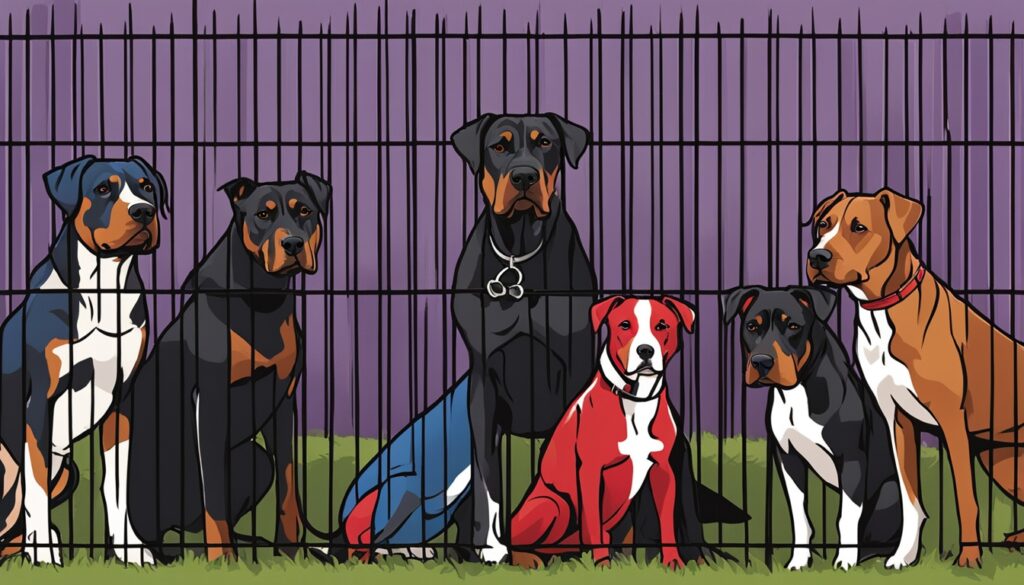
“Insurers often view these breeds as posing a higher risk of biting and causing severe injuries, leading to costly liability claims.”
The Controversy Over Banned Dog Breeds
Homeowners insurance companies use banned breed lists, sparking a big debate. Dog lovers say these policies are unfair and target certain groups unfairly. They claim these policies unfairly hit people who don’t know much, minorities, and those with less money.
They believe breed-based discrimination lacks solid science. They say insurers should look at a dog’s behavior and temperament, not just its breed.
Some think breeds like pit bulls, Doberman pinschers, and Rottweilers are always aggressive. But studies reveal a dog’s actions come from many things, not just its breed. This includes training, how it was raised, and its environment.
“Dogs of any breed can exhibit a spectrum of behaviors, from gentle to potentially aggressive, highlighting the diversity in behavior within a single breed.”
Opponents of breed-specific laws say these laws don’t work and can lead to killing healthy, friendly dogs. They propose focusing on teaching owners how to be responsible, train their dogs, and socialize them. This approach could prevent more dog bites and injuries.
The debate over banned dog breeds shows how complex and emotional this topic is. As insurers deal with the risks of certain breeds, the argument over these policies will keep going.
Dog Bite Insurance Claims and Statistics
Dog bite claims are a big worry for homeowners insurance companies in the U.S. In 2023, there were 19,062 claims, an 8.3% jump from the year before. The average cost per claim went down by 9.3% to $58,545, but the total cost was over $1.12 billion.
The Rising Cost of Dog Bite Claims
The cost of dog bite claims has jumped by 82.5% from 2014 to 2023. California saw the most claims in 2023 with 2,104. Florida had 1,532 claims. Illinois had the highest average cost per claim at $73,797, and Wyoming was close with $73,324.
Real-Life Dog Bite Incidents
Dog bites cause more than just financial trouble. For example, a 2022 case in New Jersey involved a pit bull attack on a woman and her kids. It led to huge medical bills and a big payout from homeowners insurance. Such cases show the danger dogs can pose and the importance of responsible dog ownership.
“Dog bite claims have become a significant concern for homeowners insurance companies, with the number of claims fluctuating yearly but reaching a recent high of 19,062 in 2023. The average cost per claim has also been rising, reaching $58,545 in 2023.”

About 65 million U.S. households own dogs, and 90 million dogs live in these homes. The COVID-19 pandemic caused a 4.6% drop in dog bite claims in 2020. But since then, the numbers have gone back up. This shows we need to stay alert and take steps to deal with this issue.
Breed-Specific Legislation (BSL) and Discrimination
Breed-specific legislation (BSL) bans or limits certain dog breeds. It’s a form of breed discrimination that affects homeowners insurance. These laws vary by state and city. They link a dog’s danger with its breed, ignoring the dog’s behavior and character. Critics say BSL is wrong and lacks scientific backing. Insurers argue they have a reason to exclude some breeds because they’re more likely to cause serious harm.
The Debate on Breed-Specific Legislation
There’s a long debate on using BSL to deal with dog incidents. Some think it’s needed to lower risk, but others say it’s ineffective and unfair.
- By 2020, 21 states had statewide BSL, while 29 let cities make their own rules.
- The CDC says BSL doesn’t work well in stopping dog attacks. It looks at the dog, not its actions or nature.
- More insurers are refusing policies for people with dangerous breeds, just because of the breed.
- Insurers can’t prove they’re right to discriminate by breed. Studies don’t show some breeds are always more dangerous.
The argument over BSL and insurance discrimination goes on. Both sides push for their views. As the issue is sorted out, the effect on dog owners and everyone else is a big worry.
“Breed discrimination by insurance companies is on the rise in the United States, with insurers refusing to write policies for people who own breeds considered dangerous solely based on the breed of the animal.”
The debate on BSL and insurance discrimination shows we need a smarter way to handle dog incidents. As we work through this issue, the rights and safety of dog owners and everyone else are key topics.
What Dog Breeds Affect Homeowners Insurance
Some dog breeds can change how much you pay for homeowners insurance. Insurers see certain breeds as more likely to bite and cause serious injuries. This can lead to higher premiums or even no coverage for these breeds.
Doberman Pinschers, Pit Bulls, Rottweilers, and others are often banned or restricted. These breeds are seen as more aggressive and risky. This makes them more expensive for insurers.
In 2022, the cost of dog-related claims went up by 31.7% to $64,555. This shows the financial risk for insurers. So, many insurers raise premiums or limit coverage for these breeds.
But, some states like Pennsylvania and Michigan protect homeowners from breed-based discrimination. In Ohio, you might need more liability coverage for certain breeds.

The effect of a dog breed on insurance varies by provider and state laws. Being a responsible owner and understanding your breed can help lower risks. This can make getting insurance easier.
Why Insurance Companies Ban Certain Dog Breeds
Risk Mitigation and Exposure
Insurance companies ban some dog breeds because of the high number of injuries and deaths from attacks. They point out that breeds like Pit Bulls, Rottweilers, and Doberman Pinschers are often behind these attacks. These aggressive dog breeds cause a lot of dog bite claims, leading to big medical bills and legal costs. By not covering these high-risk breeds, insurers try to lower their risks and keep insurance costs down.
Every day, nearly 1,000 people in the U.S. get rushed to the ER for serious dog bites. Insurance companies don’t cover all dog breeds; some are restricted or banned. But, some companies like State Farm, USAA, Amica, Fireman’s, Chubb, and Nationwide are more open with their dog breed restrictions.
Owners of high-risk breeds might pay more for homeowners insurance. But, popular dog breeds like Beagle, Golden Retriever, Labrador Retriever, Irish Setter, Pug, Collie, French Bulldog, Newfoundland, and Bernese Mountain Dog are usually covered.
Even without breed restrictions, insurance companies look at each dog differently. Training, exercise, and responsible ownership can prevent behavior issues and insurance claims for powerful breeds.
“The total number of dog bite claims nationwide increased from 17,597 in 2022 to over 19,000 in 2023. The average cost per dog bite claim decreased from $64,555 in 2022 to $58,545 in 2023. From 2014 to 2023, the average cost per dog bite claim increased by 82.5%.”
State Laws and Regulations on Breed Discrimination
In most states, insurance companies can legally discriminate against certain dog breeds. But, some states like Connecticut, Michigan, Nevada, New York, and Pennsylvania have laws to stop this. These laws prevent insurers from denying coverage just because of a dog’s breed. Other states might require owners of certain breeds to have a minimum amount of insurance.
South Carolina’s House Bill 4094 from 2021 deals with breed-specific laws. Overland Park, Kansas, has breed rules since 2006. Beaufort County, South Carolina, added breed rules in 2019.
Forbes says in April 2021, Doberman Pinschers, Pit Bulls, and Rottweilers were most often banned by insurance. Chow Chows, Wolf dogs, and Presa Canario were also often banned.
| Breed | Ban Rate |
|---|---|
| Doberman Pinscher | 100% |
| Pit Bull | 100% |
| Rottweiler | 100% |
| Chow Chow | 95% |
| Wolf Dogs/Hybrids | 93% |
| Presa Canario | 86% |
A study in the Journal of the American Veterinary Medical Association found breed laws don’t really lower the risk of dog bites. The American Veterinary Society and the National Animal Care & Control Association also don’t support these laws.
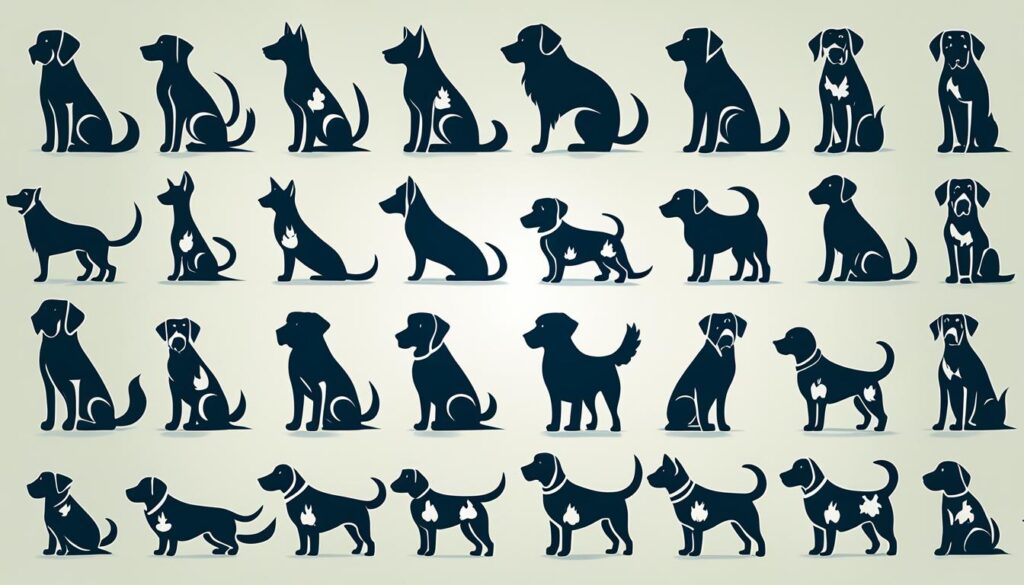
The debate on breed-specific laws is ongoing. It makes things complicated for insurance companies and dog owners when dealing with homeowners insurance.
The Impact of Breed Bans on Dog Owners and Shelters
Breed bans by insurance companies and laws can really affect dog owners and shelters. These policies might make owners give up their pets, leading to overcrowding in shelters. This can make dogs more stressed and change their behavior. Breed bans might also lead to irresponsible ownership, as owners try to avoid rules and vet care.
It’s hard to find homes for banned breeds, which can result in more dogs being put down. This is a big worry for groups that support dogs.
Many American households have dogs, with over 63 million homes owning at least one. This means a lot of people could be affected by insurance issues or higher costs for certain breeds.
Many homeowners might not know how their insurance covers dog incidents. A survey found 48% didn’t know about their liability coverage, and 24% didn’t read their policies. This can leave owners without insurance when they need it most, especially if their breed is banned.
| Breed | Inclusion on Insurance Blacklists |
|---|---|
| Pit Bull Terriers | Commonly found on insurance blacklists |
| Rottweilers | Commonly found on insurance blacklists |
| Doberman Pinschers | Commonly found on insurance blacklists |
| German Shepherds | Commonly found on insurance blacklists |
| Alaskan Malamutes | Commonly found on insurance blacklists |
| Siberian Huskies | Commonly found on insurance blacklists |
| Chow Chows | Commonly found on insurance blacklists |
| Great Danes | Commonly found on insurance blacklists |
Breed bans have big effects on dog owners and shelters. Insurance companies and lawmakers say these bans are needed to reduce risks. But, the impact on responsible owners and shelter animals is huge. The debate on these policies is ongoing. We need to find solutions that keep everyone safe while also caring for dogs and their owners.
Alternatives for Owners of Banned Dog Breeds
For owners of dog breeds banned or restricted by insurance policies, there are options. Navigating breed-specific insurance challenges can be tough. Yet, there are strategies to protect your pet and your finances.
Seeking Exceptions and Documentation
Some insurers might cover banned breeds if you provide certain documents. This could be a temperament test or a history of the dog’s training. Showing the insurer your dog is well-behaved might help get coverage.
Shopping Around for Dog-Friendly Insurers
Looking for insurers with lenient breed policies is another option. Some insurers might be more open to covering these breeds. They might look at the dog’s temperament and training, not just its breed.
Umbrella and Pet Liability Insurance Options
Owners of banned breeds might also consider umbrella or pet liability insurance. These policies offer extra protection for dog-related incidents. They can cover more than a standard homeowners policy. By getting these policies, owners can lower the financial risks of having a restricted breed.
| Dog Breed | Average Monthly Insurance Cost |
|---|---|
| Labrador Retriever | $37.50 |
| Golden Retriever | $38.44 |
| Chihuahua | $16.37 |
| American Pit Bull Terrier | $39.93 |
| French Bulldog | $50.77 |
| Boxer | $50.55 |
| Mixed Breed | $15.48 – $26.77 |
| Ragdoll Cat | $20.11 |
| Russian Blue Cat | $19.01 |
Exploring these alternatives helps owners of banned breeds protect their pets and finances. It ensures a responsible and harmonious approach to dog ownership.

Responsible Dog Ownership and Bite Prevention
To lower the risk of dog bites and avoid breed-specific exclusions from homeowners insurance, being a responsible dog owner is key. This means giving your dogs the right care, training, and social skills. It also means knowing how to read their body language to stop aggressive behavior before it starts.
Veterinary Care and Training
Seeing a vet regularly is a must for your dog’s health and happiness. Vets keep your pet current on shots and handle any health issues. Also, training with a pro can teach your dog to behave well and get along with others, cutting down on the chance of biting incidents.
Socialization and Understanding Dog Body Language
Starting socialization early is key for your dog’s growth and safety with people and other animals. By giving your dog positive experiences, they’ll grow up confident and calm. Knowing how dogs show stress or discomfort helps you step in early to stop fights.
Experts say pick the right breed for your family, keep your dogs active, and teach your friends how to meet dogs safely. Being a responsible owner and taking steps ahead of time helps keep your pet covered by insurance. It also makes your community safer for everyone.
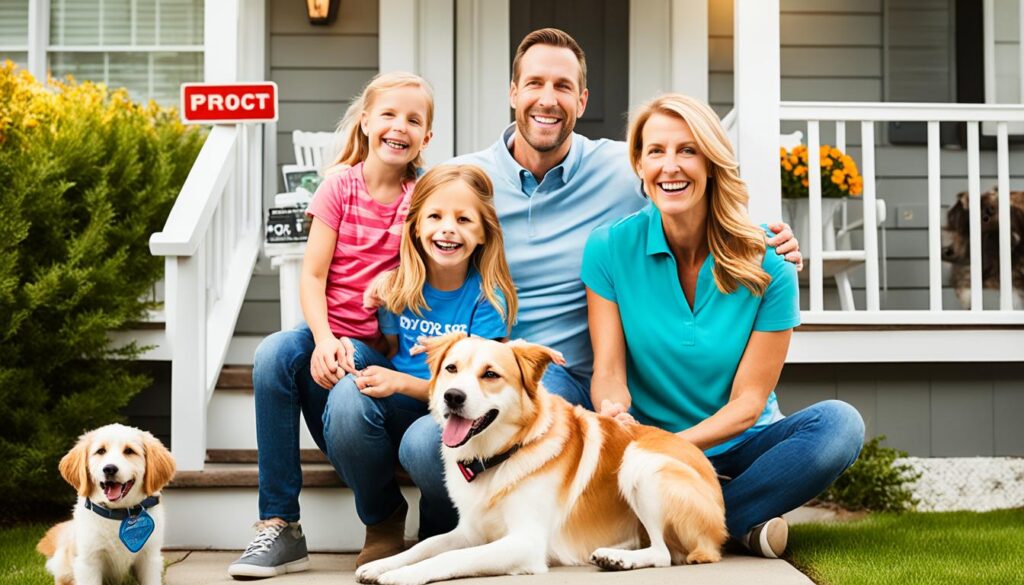
“Responsible dog ownership is the key to preventing dog bites and ensuring your canine companion is welcomed in your community.”
Personal Liability Coverage and Dog Bite Exclusions
Homeowners insurance usually covers you if your dog bites someone. But, if your dog is on a banned list or has bitten before, coverage might not be there. In these cases, you could be personally liable for medical bills and legal costs. Your insurance won’t cover the claim.
Many homeowners insurance policies don’t cover certain breeds like Pit Bulls, Rottweilers, and Doberman Pinschers. These breeds are seen as high-risk. So, if your dog is one of these, you won’t get insurance help for any incidents.
- If you have a breed that’s restricted or banned, you might need extra insurance. This could be umbrella or pet liability insurance to cover lawsuits and costs from dog bites or attacks.
- Make sure to read your insurance policy well. Know what breeds are restricted and what coverage you have for your dog.
- Being a responsible pet owner helps lower the risk of dog incidents. This includes training, socializing, and taking your dog to the vet regularly.
Dog owners should know how their pet’s breed affects their insurance. By understanding the risks and keeping their dog safe, they can protect themselves and their families from dog-related costs.
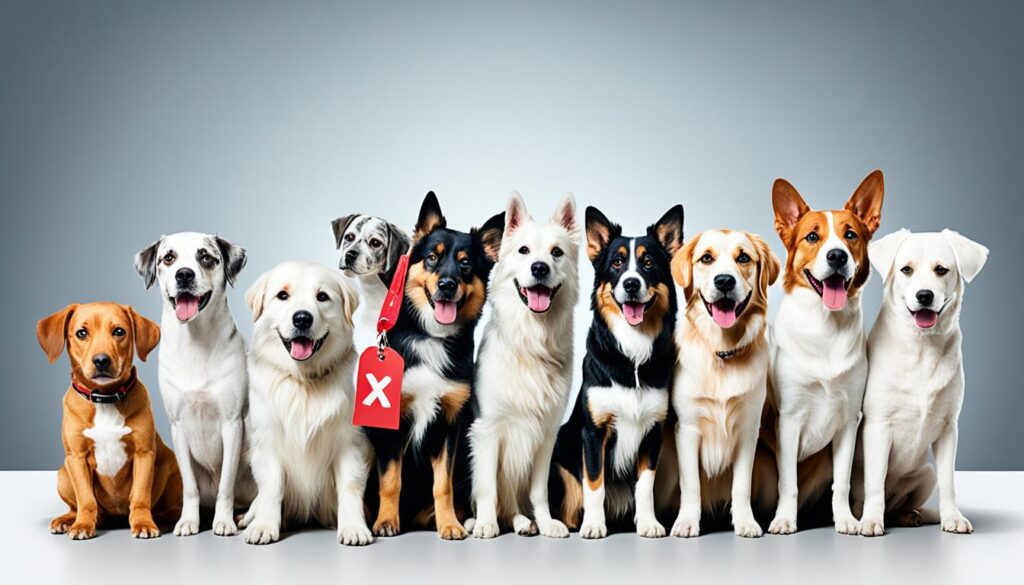
“Responsible dog ownership is essential for maintaining comprehensive homeowners insurance coverage and avoiding potential financial liabilities related to dog bites or attacks.”
Conclusion
Homeowners insurance and certain dog breeds have a complex relationship. Insurers see breeds like Pit Bulls, Rottweilers, and Dobermans as high-risk. This means they might not cover these breeds or have special rules for them.
This is because these dogs are often involved in more serious bites. These incidents can lead to high insurance claims. Insurers try to reduce these costs by limiting coverage for these breeds.
Lists of banned breeds have caused a lot of debate. Dog lovers say it’s unfair and discriminatory. But insurers say they’re just looking at the facts. They point to data on bite incidents and the risk of serious injuries.
For dog owners, it’s important to know about these breed restrictions. They should look for insurers that cover dogs, ask for exceptions, or get extra insurance. This helps protect their pets and their homes.
As insurance and dog policies change, both sides need to be open-minded and well-informed. Encouraging responsible dog ownership and supporting policies based on facts can help. This way, all dog breeds and their owners can be treated fairly.

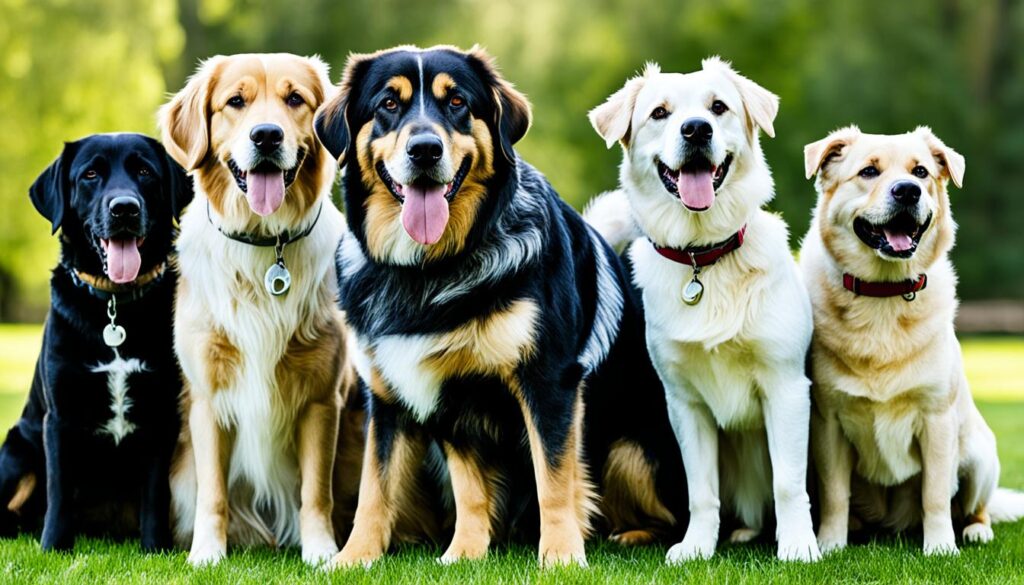
Selecting the best non-stim pre-workout is decided by your specific fitness goals.
Whether Or Not you’re looking to maximize muscle pumps, enhance
endurance, or help muscle achieve, there’s an option for you.
Nutricost’s Stim-Free pre-workout is our choose for one of the best total, offering a well-rounded blend
of performance-enhancing components at an inexpensive price.
In The Meantime, Transparent Labs delivers wonderful choices for
bodybuilders, endurance athletes, and people looking for a creatine-infused formulation. Creatine is considered one
of the most well-researched dietary supplements for energy
and muscle progress. Transparent Labs Stim-Free consists
of creatine monohydrate in its stim-free pre-workout, making it a wonderful choice for those trying to improve their energy with out caffeine.
L-Citrulline Malate is a key ingredient on this method,
aiding in nitric oxide manufacturing, which reinforces blood flow and muscle pumps.
Prospects find this protein powder has good nutritional value and is
straightforward to mix with water or milk. They appreciate its quality elements and
creatine content, which helps construct muscle. Nonetheless, opinions differ on the style, texture, and worth
for cash. Prospects find the nutritional complement has a
great taste and does not go away a weird aftertaste.
One of the standout options of this pre-workout is its transparency—every ingredient is clearly
listed with exact dosages, guaranteeing that you’re getting clinically supported quantities of each compound.
This pre-workout is loaded with L-Citrulline Malate, Beta-Alanine, and BCAAs, that are essential for muscle recovery and efficiency.
The absence of artificial components makes it a clean choice
for many who are mindful of what they put into their bodies.
Transparent Labs PreSeries Stim-Free is an incredible
choice for those in search of stimulant free dietary supplements for energy coaching, weight reduction, and improved performance.
Saccharine, which you may know as Sweet N’ Low, is 300 to four hundred times sweeter than sugar and was first
produced in 1879 however wasn’t mass marketed until the sugar shortages of WWI.
Nonetheless, some latest rat studies recommend Splenda could have antagonistic results on good intestine micro
organism. It also may have some unwanted effects on metabolism,
and long-term results are still unclear. There are questions and possible concerns about
baking with Splenda as a outcome of it might react underneath heat.
Of course, in pre-workout drinks, warmth stability isn’t a
requirement. Sucralose is a zero-calorie synthetic sweetener discovered by a British scientist in 1976.
They changed the hydrogen and oxygen bonds in sugar with chlorine, creating a substance that ranges from 200 to 400
occasions sweeter than sugar.
Nonetheless, if you’re going hard for a protracted period of time, having that additional BCAAs might
then become a bona fide benefit. In fact, creatine is essentially the most well-researched complement and the most effective.
Within the health business, creatine is one of few
issues that “guarantees” success. BCAA and creatine are two of the highest supplements available on the market right now.
And by “top” I merely imply that they are two of the most bought supplements.
In this text, we’re going to talk about creatine and BCAA and which
one you want to take.
As you experiment with different dietary supplements and mixtures, pay shut consideration to how your physique reacts.
Making Certain adequate vitamin D consumption via dietary supplements or sunlight publicity can complement your supplement combine.
Omega-3 fatty acids, generally present in fish oil dietary supplements, possess anti-inflammatory properties.
Combining beta-alanine with creatine and BCAAs could be particularly advantageous for athletes engaged in sports requiring prolonged efforts, corresponding to long-distance working or
cycling. Be ready to fine-tune your dosages based mostly on your body’s needs and your performance targets.
If you expertise adverse results or discomfort, regulate your
dosages or seek the guidance of a healthcare professional.
Protein shakes, smoothies, or flavoured water could
make taking these dietary supplements more gratifying.
The free energy that’s released from the hydrolysis of phosphocreatine is used as a buffer through the
resynthesis of ATP. This complete process helps to make sure vitality availability to energy maximal effort anaerobic activities(4).
The major metabolic function of creatine is to mix with phosphate to
kind PCr via numerous enzymatic reactions.
Integrating these dietary supplements into our routines, we gathered firsthand insights into their efficiency and user expertise, ensuring our suggestions have been each practical and reliable.
Cracked does embody some top-notch vitamins and minerals, which our testers appreciated for general health benefits.
Its label divides ingredients into “Power Matrix,” “Depth Matrix,” and “Stimulatory Matrix.” Jacked Manufacturing Facility Altius stands out as
a stimulant-rich pre-workout, similar to Pre
Jym. Whether Or Not that is a pro or a con is dependent upon personal
style and the way well you handle stimulants.
Our testers felt a boost in their exercise efficiency, although
some experienced a brief tingling sensation, more so in the occasion that they
had been espresso drinkers. Not Like many dietary supplements
utilizing caffeine anhydrous from espresso plant seeds and leaves, Bare Energy opts
for caffeine from unroasted espresso beans.
While everybody’s fitness journey is exclusive, the optimum time to
supercharge your regimen with highly effective BCAAs, creatine, and pre-workout is mostly about 30 minutes
earlier than you hit the fitness center. Regardless, you won’t need to cope with any negative effects artificial sweeteners might have in your long-term well being.
There’s broad consensus that saccharine is secure right now,
however in the 1970’s it was linked to bladder most cancers in rats.
Extra recent observational studies in humans don’t support that finding, however to be on the safe side,
many still select to keep away from saccharine.
There are several several types of synthetic sweeteners
generally present in pre-workout drinks. Other artificial sweeteners don’t
increase phenylalanine or aspartic acid and may not set off the same neurologic problems.
If excessive caffeine pre-workouts make you
feel jittery and uncontrolled, but you still want something
to get you going, Clear Labs Lean Pre-Workout may be perfect.
This course of can enhance athletic efficiency, improve
energy, and enhance muscle mass. Selecting the best creatine mixture depends on your health objectives.
Whether Or Not you’re aiming for muscle development, endurance, power, power,
or recovery, stacking creatine with BCAA, Tongkat Ali and Omega-3 can maximize your well
being and athletic performance over short-term
and long-term. Omega-3s, primarily EPA (Eicosapentaenoic
acid) and DHA (Docosahexaenoic acid) and Tongkat Ali
root extract are identified for their anti-inflammatory properties.
Research recommend that Omega-3 supplementation could cut back exercise-induced muscle soreness and improve joint mobility, notably in athletes engaged
in high-impact sports activities or power training.
If you are consuming sufficient high-quality protein from sources like chicken, beef,
fish, yogurt, and sure plant-based meals like peas or soy, you in all probability won’t profit from BCAAs if your aim is to construct muscle.
Combining BCAA and creatine offers dual benefits
for athletes aiming to extend lean muscle mass and accelerate restoration. BCAAs are
essential for muscle protein synthesis and may help reduce muscle breakdown during train, while creatine enhances energy and power, contributing to more important muscle development
over time. Together, they offer a complete method to support
muscle restoration and the development of lean body mass, making them
a strong duo in sports vitamin. BCAAs, or Branched-Chain Amino
Acids, are important nutrients that the physique obtains
from proteins found in meals, notably meat, dairy products, and legumes.
Comprising three essential amino acids – leucine, isoleucine, and
valine – BCAAs play a major position in muscle protein synthesis and progress.
They are significantly known for supporting muscle restoration post-exercise,
reducing muscle soreness, and probably enhancing muscle growth over time.
These complement significantly when paired with creatine and Tongkat Ali for optimal
muscle recovery support if you are training greater than 5 days every week, especially in older adults above forty.
It is a well-liked complement amongst athletes, which aids in muscle development, energy workout routines and improves efficiency (5).
Pre-workout dietary supplements are designed to provide you
a boost of energy before exercising. They often comprise components
like caffeine, amino acids, and nutritional vitamins to
extend alertness and stamina throughout your workout.
But for muscle protein synthesis (MPS) to happen, the body requires all
nine important amino acids to be present, along with the eleven non-essential amino acids, in enough amounts.
Therefore, their pivotal function in muscle protein synthesis and muscle restoration is the very purpose why they have been touted to be such an necessary complement to take.
While that’s not entirely false, as with every thing, there’s
a little bit of nuance concerned. Prospects recognize the excessive protein content and good
nutritional worth of the product. They say it
helps them meet their protein objectives and promote muscle
progress. The plant-based proteins provide a prime quality combination that supports muscle
development and recovery. They are also pleased
with the added amino acids and contemplate it one of the best protein shakes they’ve ever had.
Clients recognize the clear, plant-based ingredients and find it smoother than others they’ve tried.
Athletes aiming for energy positive aspects can benefit from the enhanced vitality and muscle protein synthesis provided by this combination. The
supplement is natural with only 7 ingredients, together with caffeine and 5 grams of creatine per serving.
The product is dosed at proper scientific amounts, and it additionally incorporates 6g of citrulline, whereas most different pre-workouts skimp on this ingredient.
They say it provides a surge of power that lasts all through the
day and pre-workout, with no artificial dyes or sweeteners.
This is because the sugar in juice produces an increase in insulin, which will increase the speed of nutrient
uptake. Mixing your creatine with juice is a good choice to help disguise
the style of the creatine, which tends to have a chalky style on its own. My favorite
model of creatine monohydrate is the PEScience TruCreatine because
it is third-party tested, which means that it has been verified by a 3rd party
for label accuracy and purity. For these causes, I advocate ready at least 4 hours after taking your creatine before consuming alcohol to attenuate
interference results.
Clients recognize the vitality degree of the nutritional complement.
They discover it provides a gradual boost of energy, focus, and endurance without any unwanted aspect effects.
The components provide a perfect stability of
vitality, focus, endurance, and sheer energy. They say it enhances coaching periods from working or working out chest
sets. It supplies an vitality enhance and alanine for a fantastic pump throughout high-intensity
exercises. The flavor is great for both men and women, and so they discover it
to be top-of-the-line pre-workouts.
Perhaps the only benefit of consuming BCAAs is that
they taste good. If you find ingesting water all day to be “bleh”
and sports activities drinks are too sweet, BCAAs actually taste fairly good and
may encourage hydration. They are relatively cheap and when you assume about every little thing, it might truly be a valid purpose for buying
for many people. Plus, many manufacturers will
now embrace different compounds corresponding to electrolytes
which is fantastic for hydration. So for all intents and purposes, the time period “protein” simply means a bunch of amino acids chained together.
They say it is a strong performer, does its job, and has sufficient citrulline
for good pumps. Remember, BCAA are found in meat, poultry, dairy products and a few vegetables.
When it comes to these nutrients, Emily Danckers,
MS, RD, and diet coach, says that the motto should be “food first.” Each BCAA
and creatine are found in meals. For instance, both creatine and BCAAs could be found in purple meat and
fish.
Pre-workouts are multi-ingredient supplements that are formulated to assist vitality, focus, pumps and endurance.
They usually embrace ingredients like caffeine, nootropics, and amino acids.
Pre-workouts assist hold your mind and physique in the zone during your training sessions
so you presumably can attempt to get probably the most out of each exercise.
The aim with pre-workouts is to provide your physique with the best gas before you step foot within the fitness center to perform at your best.
Results also assist that the SUP might cut back each emotions of fatigue and precise fatigue, which may
end up in efficiency will increase in both
muscular endurance and response time.
In truth, many dietary supplements – particularly pre-workout
dietary supplements, which we’ll get to subsequent – mix BCAAs and creatine.
When used correctly and in accordance with the really helpful dosages, pre-workout
dietary supplements are typically safe. It’s
essential to choose high-quality products and be conscious of how your body reacts to
stimulants like caffeine. There are not any adverse interacts between creatine, BCAAs, and pre-workout powders.
They’re not like protein powders and mass gainers, which should not be mixed.
Methanol does break down additional into formaldehyde,
a toxic carcinogen, but we normally consume such small amounts of aspartame that it’s
not an issue. It’s linked to complications, temper problems and is a potential seizure set off.
Aspartame, also marketed as NutraSweet or Equal, is approximately 200 instances sweeter than sugar.
Researchers created it in 1965, and the FDA approved it in 1981, which means there are over four decades of research on it.
NutraBio’s All Pure Pre-Workout provides two forms of natural caffeine to maintain you
going with none jittery emotions.
This permits people to carry out extra repetitions or carry heavier weights, leading to
elevated muscle development and strength over time.
Plus, BCAAs are known to stimulate the release of insulin,
a hormone that promotes muscle progress and recovery.
They may assist scale back muscle soreness and fatigue after
strenuous train. Many athletes and fitness enthusiasts
do that to conveniently consume each supplements on the similar time, which can be particularly
helpful during workouts to assist muscle building
and recovery. Pre Jym, a veteran in the pre-workout supplement sport for almost ten years, packs a punch with
creatine, beta-alanine, caffeine, and BCAAs. These components, especially
BCAAs, are known to minimize back muscle soreness and fatigue, as highlighted
by Frontiers in Physiology [2].
It focuses on ultraclean, high-grade components which would possibly be simple on the stomach and provide quick absorption. While
timing can marginally affect effectiveness, total day by day intake and consistency
matter considerably more. For those battling adherence, deciding on any consistent day by day
time that matches your way of life will produce higher outcomes than difficult protocols.
The majority of it (95%) is saved in your muscular tissues,
and a small amount can be present in other tissues, notably
your brain.
Mixing and timing your supplements thoughtfully can mitigate these interaction risks, permitting your body to harness the total
spectrum of benefits. Last however certainly not least, not all dietary
supplements are created equal. With Natural Muscle, you’re assured licensed organic supplements that are non-GMO, vegan, gluten-free,
and beyond. Skimping on high quality can result
in consuming components or fillers that do more hurt than good.
References:
anabolic steroids articles; doodleordie.com,
References:
strongest oral steroids https://git.uspex-team.org/aracelyfreund
steroids for runners https://www.herzog-it.de/kathlenemunson
hgh vs steroids difference https://www.jimmyb.nl/deboramast1972
buying steroids online https://git.prlab.io/akilahcarbajal
Best Injectable Steroids For Sale https://git.boone-schulz.de/margerycaudill
fat burning steroids http://www.kanghexin.work:3000/johnathanf7251
illegal steroids names https://git.diefleckenbuehler.de/fideliagamboa
steroid effects On Females http://hongleiyu.com:4000/cherieketcham1
Best Steroids for muscle growth http://git.rootbranch.co.za:7891/natephillips9
mental enhancement drugs http://mashirospace.cn:8418/rileypaul41321
anabolic steroids facts https://gitea.thuispc.dynu.net/devon26j097672
Anabolic Steroids Trenbolone https://nemoserver.iict.bas.bg/judetenorio568
high testosterone joint pain https://samisg.eu:8443/mattbetts72966
legal Steroids for Athletes https://gitlab.kitware.com/rozellaleichha
New legal steroids gnc https://git.wastring.com/xiomaragregori
onyx labs steroids https://git.caraus.tech/denaharkness9
References:
https://git.fpghoti.com/keeleyfauchery